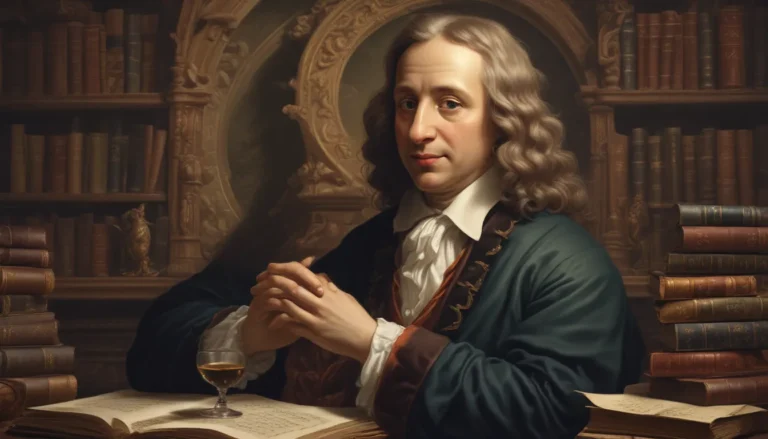The images in our articles may not match the content exactly. They are used to grab your attention, not to show the exact details in the text. The images complement the text but do not replace it.
If you have a keen interest in the lives of influential figures who have shaped our understanding of democracy and political governance, then you’re in for a treat. In this article, we will unravel the extraordinary life of Robert A. Dahl, a distinguished political scientist whose work has had a profound impact on the field of democratic theory. Join us as we explore 14 mind-blowing facts about Robert A. Dahl that will deepen your appreciation for his intellectual prowess and enduring legacy.
The Legacy of Robert A. Dahl
Robert A. Dahl: A Trailblazer in Political Science
At the forefront of political science in the 20th century, Robert A. Dahl was hailed as one of the most influential figures in the field. His extensive research and groundbreaking theories on democracy, power, and citizen participation have left an indelible mark on political scholarship.
Revolutionary Concepts in Democratic Theory
Dahl’s seminal work, “Polyarchy: Participation and Opposition,” introduced the concept of “polyarchy,” redefining modern democratic systems as structures where power is distributed among competing groups or elites. This vision of inclusive decision-making challenged conventional views of democracy, inspiring scholars and policymakers worldwide.
Exploring Dahl’s Work
The Study of Democracy
Central to Dahl’s scholarly pursuits was the examination of democracy, its principles, and the mechanisms that uphold or undermine it. His critical insights into the complexities of democratic governance have shaped contemporary discourse on political systems.
Shaping Power Relations in Society
Dahl’s exploration of power dynamics in society revolutionized our understanding of political influence. His definition of power as “the ability to get others to do what they otherwise would not” remains a cornerstone of political science, influencing scholars and policymakers to this day.
Advocating for Citizen Participation
Recognizing the vital role of active citizen engagement in sustaining democratic processes, Dahl emphasized the need for mechanisms that empower individuals to contribute meaningfully to decision-making. His advocacy for inclusive participatory systems has resonated across diverse political landscapes.
The Impact of Dahl’s Work
Beyond Academic Borders
While Dahl’s scholarly contributions were celebrated within academic circles, his expertise transcended the confines of academia. He advised governments, international organizations, and actively promoted democratic reforms on a global scale, underscoring his enduring influence on political governance.
Challenging Traditional Notions of Democracy
By interrogating idealized notions of democracy, Dahl pushed the boundaries of conventional thinking, prompting a reevaluation of entrenched beliefs. His research shed light on the nuanced realities and limitations of democratic systems, fueling a deeper understanding of political governance.
A Distinguished Legacy
Dahl’s profound impact on political science was acknowledged through prestigious accolades such as the Johan Skytte Prize in Political Science, the James Madison Award, and the Woodrow Wilson Award for Lifetime Achievement in Political Science. His enduring legacy continues to inspire generations of scholars and policymakers.
Continuing Influence
Multifaceted Research Contributions
Throughout his illustrious career, Dahl delved into diverse topics within political science, including pluralism, democratic institutions, elite dynamics, and power structures within societies. His multifaceted approach enriched the field and catalyzed further exploration in political scholarship.
Prolific Authorship
As a prolific writer, Dahl produced a wealth of influential books and articles that have become foundational texts in the study of political science. Works such as “Democracy and Its Critics” and “How Democratic Is the American Constitution?” continue to shape scholarly dialogue and inform contemporary debates.
Global Reverberations
Dahl’s theories and insights transcended national boundaries, inspiring scholars and policymakers worldwide. His research on democratization and the challenges of democratic governance retains relevance across diverse contexts, shaping contemporary political discourse.
Inspiring Future Generations
A Scholarly Stalwart at Yale University
For over four decades, Dahl served as a revered professor at Yale University, imparting knowledge to successive generations of students and enriching the intellectual landscape of the institution. His teachings have left an indelible mark on aspiring political scientists.
A Lasting Intellectual Legacy
Robert A. Dahl’s legacy lives on in the realm of political science, as his groundbreaking theories, unwavering commitment to democracy, and dedication to research continue to illuminate our understanding of political systems. His work remains a guiding beacon for scholars and policymakers striving to build more just and equitable societies.
In Conclusion
In conclusion, Robert A. Dahl’s legacy as a trailblazing political scientist is nothing short of awe-inspiring. His profound insights into democracy, power dynamics, and citizen engagement have reshaped our understanding of governance and political systems. As societies navigate the complexities of democratic governance, Dahl’s emphasis on inclusivity, citizen empowerment, and individual rights remains a beacon of guidance. His intellectual curiosity and relentless pursuit of knowledge serve as a testament to the enduring impact of scholarly inquiry.
FAQs
Q: What are some of Robert A. Dahl’s most significant contributions to political science?
A: Robert A. Dahl made notable contributions to political science, particularly through his work on pluralism and the distribution of power in democratic systems. Concepts like “polyarchy” and “polycentrism” revolutionized how political scientists analyze power structures within societies.
Q: How did Robert A. Dahl’s ideas on power and democracy shape political thought?
A: Dahl’s emphasis on citizen participation and inclusivity in democratic systems has had a profound influence on political thought. His advocacy for a more egalitarian approach to governance continues to inform contemporary discussions on democracy and inspire efforts towards more responsive political systems.
Q: Did Robert A. Dahl receive recognition for his work?
A: Yes, Robert A. Dahl received numerous awards and honors for his contributions to political science, including the prestigious Johan Skytte Prize in Political Science and the Woodrow Wilson Foundation Award. His work is widely respected within academic circles and has had a lasting impact on the field.
Q: How does Robert A. Dahl’s work remain relevant today?
A: Dahl’s research remains relevant today as societies grapple with questions of power, democracy, and inclusivity. His theories provide a framework for understanding contemporary governance challenges and offer valuable insights for those seeking to enhance democratic systems.
Q: Can you recommend further reading on Robert A. Dahl’s work?
A: Certainly! Books such as “Democracy and its Critics,” “Polyarchy: Participation and Opposition,” and “On Democracy” delve deeper into Robert A. Dahl’s theories and offer valuable perspectives on his contributions to political science.
As we conclude this exploration of Robert A. Dahl’s remarkable life and scholarly legacy, we invite you to delve deeper into the rich tapestry of political science. Embrace the spirit of inquiry, challenge conventional wisdom, and join the ongoing dialogue on democracy, governance, and societal progress. Let Robert A. Dahl’s pioneering spirit guide you as we navigate the complex terrain of political systems and strive for a more enlightened and inclusive future.






